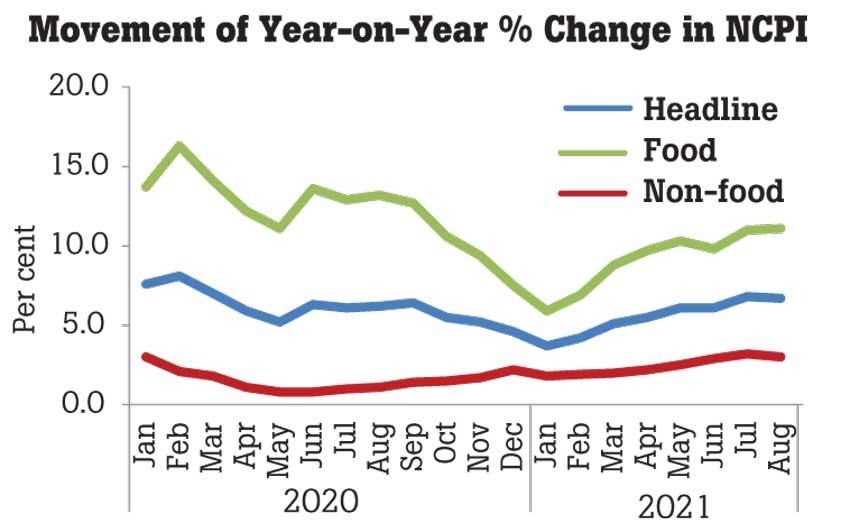23 Sep 2021 - {{hitsCtrl.values.hits}}

Sri Lanka’s national prices eased in August on both food and non-food prices but the level of decline isn’t enough to assuage concerns over the exorbitant prices daily confronted by the people on everything, from food staples to durables to other high-ticket value goods and services.
The price movements measured by the National Consumer Price Index (NCPI) rose 6.7 percent in August from a year ago, compared to 6.8 percent in July, when the prices hit a 16-month high, as the pandemic-induced supply chain disruptions, increase in global commodities prices, controls on imports and local prices and the sharp depreciation of the rupee against the dollar pushed up the domestic prices.
Some argue that the record liquidity pumped by the Central Bank through failed T-bill and bond auctions also fed into the local prices by way of stoking demand when the supply hasn’t budged, in fact interrupted, a claim the Central Bank has repeatedly denied.
However, the Central Bank raised the key interest rates on August 19, in a pre-emptive move to ward off any persistent pressures on prices, as they increasingly worried about some of the higher global prices could remain longer than anticipated.
In what could be a consoling development, the monthly ascent in overall consumer prices in the economy decelerated to 0.3 percent, from 0.6 percent in July and from a peak of 1.5 percent seen in June.
This trajectory was also seen in both food and non-food prices, which recorded deceleration in monthly prices in both categories.
For instance, the food prices, which rose by 11.1 percent in the 12 months to August, accelerating from 11.0 percent in July, eased to 0.6 percent in August, from 0.8 percent in July.
If this spells the beginning of an easing round of food prices is too soon to be determined. But it provides some vindication for those who held the view that the recent price pressures were ‘transitory’ than ‘persistent’.
During August, the prices of sugar, potatoes, fresh fish, Mysore dhal, chicken, dried fish, fresh fruit, eggs, canned fish and a few more rose from a month ago levels while the prices of rice, coconut oil, coconut and a few others declined from July levels.
The government on August 30 declared emergency regulations pertaining to the distribution of essential food items, in a bid to tackle the soaring prices of daily essentials and appointed a retired Major General as the Commissioner General of Essential Services to ensure the people have the access to the essential supplies such as rice, sugar and paddy at state guaranteed prices.
Meanwhile, the non-food prices eased both from a year ago levels and a month earlier levels, as gas prices eased after the government gave consent to a request for price increase by the second largest player in the duopoly gas market, restoring supplies.
As a result, the non-food prices rose by 3.0 percent from a year ago levels, decelerating from 3.2 percent in July, while the MoM price increase fell sharply to 0.1 percent, from 0.5 percent in July, as people restricted most of their outdoor activities to stay safe from the virus, as the country went into lockdown for the fourth time from August 20.
Meanwhile, the so-called core national prices measured barring the often volatile items such as food, energy and transport, rose by 4.7 percent during the 12 months to August, accelerating from 4.4 percent in July
17 Nov 2024 17 Nov 2024
17 Nov 2024 17 Nov 2024
17 Nov 2024 17 Nov 2024
17 Nov 2024 17 Nov 2024
17 Nov 2024 17 Nov 2024